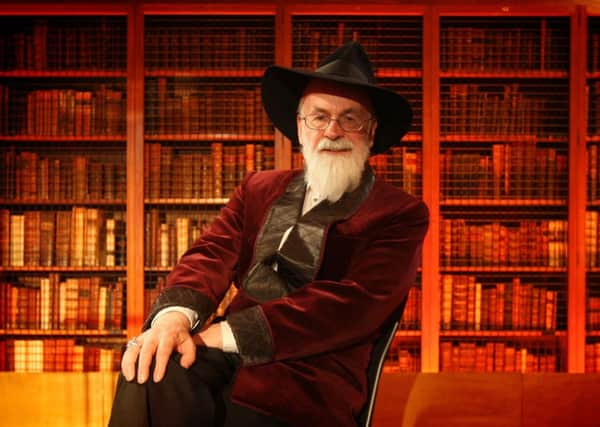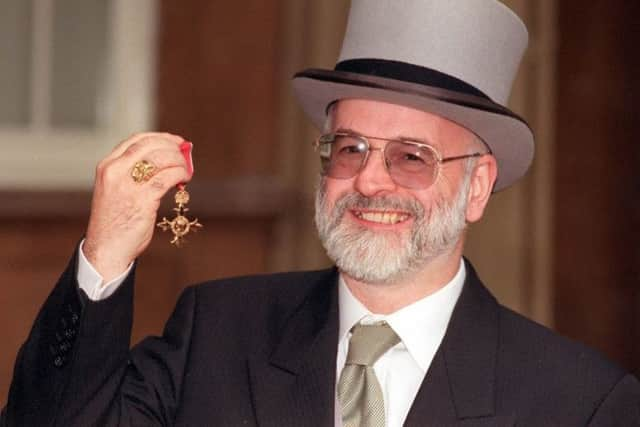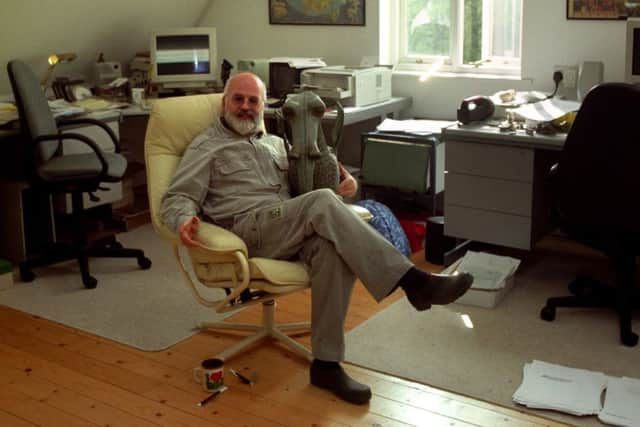Writer Terry Pratchett dead at 66 after Alzheimer’s struggle


Best-selling author Sir Terry Pratchett has died aged 66 after a very public struggle with Alzheimer’s disease.
His death was announced to fans on Twitter in a series of messages shortly after 3pm.
They read: “AT LAST, SIR TERRY, WE MUST WALK TOGETHER.
Advertisement
Hide AdAdvertisement
Hide Ad“Terry took Death’s arm and followed him through the doors and on to the black desert under the endless night.
“The End.”
His daughter Rhianna later wrote: “Many thanks for all the kind words about my dad. Those last few tweets were sent with shaking hands and tear-filled eyes.”
The news was confirmed by his publisher, Larry Finlay, who said he was “deeply saddened” by the loss of one of the world’s “brightest, sharpest minds”.


Mr Finlay, managing director at Transworld Publishers, said Sir Terry “passed away in his home, with his cat sleeping on his bed, surrounded by his family”.
Advertisement
Hide AdAdvertisement
Hide AdHe completed his last book - set like so many of his best-sellers in Discworld - last year.
Mr Finlay said: “In over 70 books, Terry enriched the planet like few before him. As all who read him know, Discworld was his vehicle to satirise this world; he did so brilliantly, with great skill, enormous humour and constant invention.
“Terry faced his Alzheimer’s disease (an ‘embuggerance’, as he called it) publicly and bravely. Over the last few years, it was his writing that sustained him. His legacy will endure for decades to come.


“My sympathies go out to Terry’s wife Lyn, their daughter Rhianna, to his close friend Rob Wilkins, and to all closest to him.”
Advertisement
Hide AdAdvertisement
Hide AdThe comic universe he created in Discworld - a flat disc balanced on the backs of four elephants standing on the back of a giant turtle - made millions laugh and made them think as well.
His sense of fun made him stand out in the often po-faced world of fantasy literature - he would turn up at conventions wearing a T-shirt saying: “Tolkien’s dead, JK Rowling said no, Philip Pullman couldn’t make it. Hi. I’m Terry Pratchett.”
Towards the end of his life, he used his fame and wealth to campaign for a greater awareness of dementia and assisted dying.
In 2011, he featured in a documentary about suicide in which he followed a man with motor neurone disease to the Dignitas clinic in Switzerland to see him take a lethal dose of barbiturates.
Advertisement
Hide AdAdvertisement
Hide AdAsked why he wanted to make the film, he said it was because he was “appalled” at the state of the law.
A year earlier, he had used the prestigious Richard Dimbleby Lecture to call for assisted suicide to be legalised. [Click the scren above to watch.]
Hilary Evans, director of Alzheimer’s Research UK, said the death of Sir Terry would have “a profound effect on both literature and the 850,000 people who live with dementia”.
She said his announcement of his own diagnosis was “a watershed moment” and “a call to arms for society to talk about dementia and take steps towards defeating it”.
Advertisement
Hide AdAdvertisement
Hide AdPrime Minister David Cameron said: “Sad to hear of Sir Terry Pratchett’s death, his books fired the imagination of millions and he fearlessly campaigned for dementia awareness.”
Sarah Wootton, chief executive of Dignity in Dying, called him “a committed campaigner” for “assisted dying”.
She said: “Sir Terry was fond of saying ‘It’s time we learned to be as good at dying as we are at living’ and his brave approach to confronting issues of death, including his own, was a heartfelt demonstration of dignity.”
Alzheimer’s Society chief executive Jeremy Hughes said Sir Terry had “fundamentally changed the way dementia is seen and understood”.
Advertisement
Hide AdAdvertisement
Hide AdSir Terry started out as a reporter for the Bucks Free Press, later joining the Western Daily Press and the Bath Chronicle before becoming a press officer for the Central Electricity Generating Board, with responsibility for three nuclear power stations, in 1980.
He published his first novel, The Carpet People, in 1971 but his career really took off after the publication of the first Discworld book, The Colour Of Magic, in 1983.
His books sold millions of copies worldwide and were translated into more than 30 languages.
Asked about his success in 2009 when he was knighted, he said: “Most writers don’t make much money, they only happen to make some if they’re standing in the station when the gravy train comes in.
Advertisement
Hide AdAdvertisement
Hide Ad“I thought I was lucky to make some money, then lucky to make a living, then lucky to be a millionaire.”
A JustGiving page in memory of the writer, who lived near Salisbury in Wiltshire, had already raised thousands of pounds for an Alzheimer’s charity in his memory less than an hour after his death was announced.
AUTHOR WHO CREATED WORLDS AND SOLD MILLIONS
Sir Terry Pratchett, creator of the long-running Discworld series of comic fantasy novels, was among the most prolific and successful authors of his generation.
He sold 70 million books world-wide with translations into more 30 languages. In the 1990s he was Britain’s best-selling author. He was, at the turn of the century, Britain’s second most-read author, beaten only by J K Rowling creator of Harry Potter.
Advertisement
Hide AdAdvertisement
Hide AdHis first novel, The Carpet People, was published in 1971 and his first Discworld novel (The Colour of Magic) was published in 1983.
At one point he held the dubious honour as the most shop-lifted author in Britain.
But health problems were to afflict him. In August, 2007, he was misdiagnosed as having suffered a stroke, but the following December he announced that he had been newly diagnosed with a very rare form of early-onset Alzheimer’s disease which, he said, “lay behind this year’s phantom stroke”.
But he urged people to “keep things cheerful”, adding: “We are taking it fairly philosophically down here” and predicting that he had time for “at least a few more books yet”.
Advertisement
Hide AdAdvertisement
Hide AdThe following March he announced that he was donating $1 million (£500,000) to the Alzheimer’s Research Trust.
Terence David John Pratchett was born on April 28, 1948 at Beaconsfield. He published his first short story at the age of 13, and later began work for the Bucks Free Press newspaper.
After various positions in journalism, he became press officer for the Central Electricity Generation Board in 1983, the year in which his first Discworld novel was published.
He gave up working for the CEGB in 1987, after finishing his fourth Discworld novel. His sales increased quickly, and many of his books occupied top places in the best-seller lists. He was the top-selling and highest-earning author in 1996.
Advertisement
Hide AdAdvertisement
Hide AdHe was well-known for wearing large black hats and his sartorial style was once described as “more that of urban cowboy than city gent”.
He was an avid computer games player and collaborated in the creation of a number of game adaptations of his books.
In 1998, he was awarded an OBE for “services to literature”.
His modest response to that was: “I suspect the ‘services to literature’ consisted of refraining from trying to write any”. Even so, he said he felt “mightily chuffed about it”.
He was knighted in 2009.
Advertisement
Hide AdAdvertisement
Hide AdReceiving the honour at Buckingham Palace, he said multimillion-pound banker bonuses should be spent helping to treat dementia patients.
Sir Terry also described the “furore” that greeted the announcement he was suffering from dementia but said it had helped raise awareness about the illness.
Dressed in a top hat and morning suit the writer said: “It would appear to me that me getting up and saying ‘I’ve got Alzheimer’s’, it did shake people, you cannot help but notice it’s in the news an awful lot.
“The thing about Alzheimer’s is there are few families that haven’t been touched by the disease.
Advertisement
Hide AdAdvertisement
Hide Ad“People come up to me and talk about it and burst into tears, there’s far more awareness about it and that was really what I hoped was going to happen.
“Everybody thinks the Government should be doing more about everything but just think how many of the bonuses which are quite rightly being dragged off certain people, just think to what good causes they could be put - wouldn’t that be a lovely thought?”
He also had many other awards to his name, including the British Books Award as the “Fantasy and Scientific Author of the Year” in 1994.
In addition, he was awarded honorary doctorates of literature by the Universities of Warwick, Portsmouth, Bath and Bristol.
Advertisement
Hide AdAdvertisement
Hide AdHis concern for the future of civilisation prompted him to install five kilowatts of photovoltaic cells (for solar energy) at his house near Salisbury. And his childhood interest in astronomy led him to build an observatory in his garden.